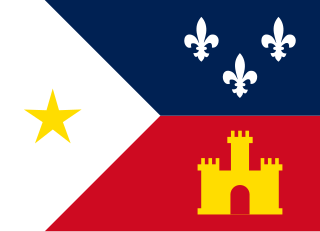
The Cajuns, also known as Acadians, are an ethnic group mainly living in the U.S. state of Louisiana, and in the Canadian maritimes provinces as well as Québec consisting in part of the descendants of the original Acadian exiles—French-speakers from Acadia (L'Acadie) in what are now the Maritimes of Eastern Canada. In Louisiana, Acadian and Cajun are often used as broad cultural terms without reference to actual descent from the deported Acadians. Today, the Cajuns make up a significant portion of south Louisiana's population and have exerted an enormous impact on the state's culture.

Acadiana, is the official name given to the French Louisiana region that was historically home to the state's Francophone population, the Acadians and Cajuns. Many are of Acadian descent and are now identified as Cajun. Of the 64 parishes that make up the U.S. state of Louisiana, 22 named parishes and other parishes of similar cultural environment make up this intrastate region.
The Council for the Development of French in Louisiana is Louisiana's Office of Francophone Affairs. It is a state agency whose multiple legislative mandates include developing opportunities to use the French language in tourism, economic development, culture, education and international relations. CODOFIL is governed by a board of 23 members and administratively placed within the Louisiana Office of Cultural Development's Department of Culture, Recreation and Tourism, overseen by the Lieutenant Governor. CODOFIL is the only state agency in the United States whose purpose is to serve a linguistic population.
Swamp pop is a music genre indigenous to the Acadiana region of south Louisiana and an adjoining section of Southeast Texas. Created in the 1950s and early 1960s by teenage Cajuns, it combines New Orleans-style rhythm and blues, country and western, and traditional French Louisiana musical influences. Although a fairly obscure genre, swamp pop maintains a large audience in its south Louisiana and southeast Texas homeland, and it has acquired a small but passionate cult following in the United Kingdom, northern Europe, and Japan.

Popeyes is an American multinational chain of fried chicken fast food restaurants founded in 1972 in New Orleans, Louisiana and headquartered in Miami, Florida. Since 2008, its full brand name is Popeyes Louisiana Kitchen, Inc., and it was formerly named Popeyes Chicken & Biscuits and Popeyes Famous Fried Chicken & Biscuits. It is currently a subsidiary of Toronto-based Restaurant Brands International.

Clifford Joseph Trahan, best known as Johnny Rebel and Pee Wee Trahan, was an American white supremacist singer, songwriter, and musician. Trahan used the Johnny Rebel name for a series of recordings for J. D. "Jay" Miller's Reb Rebel label in the 1960s, which feature overtly racist lyrics.

Louisiana or French Louisiana was an administrative district of New France. Under French control 1682 to 1762 and 1801 (nominally) to 1803, the area was named in honor of King Louis XIV, by French explorer René-Robert Cavelier, Sieur de la Salle. It originally covered an expansive territory that included most of the drainage basin of the Mississippi River and stretched from the Great Lakes to the Gulf of Mexico and from the Appalachian Mountains to the Rocky Mountains.

Coonass, or Coon-ass, is a term for a person of Cajun ethnicity. Some consider the term an ethnic insult, even though many Cajuns use the word in regard to themselves.

Louisiana Creole people, are persons descended from the inhabitants of colonial Louisiana during the period of both French and Spanish rule. The term creole was originally used by French settlers to distinguish persons born in Louisiana from those born in the mother country or elsewhere. As in many other colonial societies around the world, creole was a term used to mean those who were "native-born", especially native-born Europeans such as the French and Spanish. It also came to be applied to African-descended slaves and Native Americans who were born in Louisiana. Louisiana Creoles share cultural ties such as the traditional use of the French and Louisiana Creole languages and predominant practice of Catholicism.

Joseph Broussard (1702–1765), also known as Beausoleil, was a leader of the Acadian people in Acadia; later Nova Scotia, Prince Edward Island, and New Brunswick. Broussard organized a Mi'kmaq and Acadian militias against the British through King George's War, Father Le Loutre's War and during the French and Indian War. After the loss of Acadia to the British, he eventually led the first group of Acadians to southern Louisiana in present-day United States. His name is sometimes presented as Joseph Gaurhept Broussard; this is likely the result of a transcription error. Broussard is widely regarded as a hero and an important historical figure by both Acadians and Cajuns.

Rod Bernard is an American singer who helped to pioneer the musical genre known as "swamp pop", which combined New Orleans-style rhythm and blues, country and western, and Cajun and black Creole music. He is generally considered one of the foremost musicians of this south Louisiana-east Texas idiom, along with such notables as Bobby Charles, Johnnie Allan, Tommy McLain, and Warren Storm.
Robert Charles Guidry, known as Bobby Charles, was an American singer-songwriter.

James R. Domengeaux, known as Jimmy Domengeaux, was a lawyer from Lafayette, Louisiana, who served in the United States House of Representatives for Louisiana's 3rd congressional district from 1941 to 1949. He was a Cajun cultural activist who is best remembered for his efforts to preserve the French language in his native state.

Joseph Denton "Jay" Miller was an American record producer, musician and songwriter from Crowley, Louisiana, whose Cajun, swamp blues, and swamp pop recordings influenced American popular culture.

Louisiana was the name of an administrative district of the Viceroyalty of New Spain from 1763 to 1801 that consisted of territory west of the Mississippi River basin, plus New Orleans. Spain acquired the territory from France, which had named it La Louisiane in honor of King Louis XIV in 1682. It is sometimes known as Spanish Louisiana. The district was retroceded to France, under the terms of the Third Treaty of San Ildefonso (1800) and the Treaty of Aranjuez (1801). In 1802, King Charles IV of Spain published a royal bill on 14 October, effecting the transfer and outlining the conditions.

Cajun music has its roots based in the ballads of the French-speaking Acadians of Canada, and in country music.
Johnnie Allan, real name John Allen Guillot, is a pioneer of the swamp pop musical genre.

Louisiana French refers to the complex of dialects and varieties of the French language spoken traditionally in colonial Lower Louisiana. As of today Louisiana French is primarily used in the U.S. state of Louisiana, specifically in the southern parishes, though substantial minorities exist in southeast Texas as well. Over the centuries, the language has incorporated some words of African, Spanish, Native American and English origin, sometimes giving it linguistic features found only in Louisiana, Louisiana French differs to varying extents from French dialects spoken in other regions, but Louisiana French is mutually intelligible with all other dialects and particularly with those of Missouri, New England, Canada and northwestern France. Many famous books, such as « Les Cenelles », a poetry anthology compiled by a group of gens de couleur libres, and « Pouponne et Balthazar », a novel written by French Creole Sidonie de la Houssaye, are in standard French. It is a misconception that no one in Louisiana spoke or wrote Standard French. Figures from the United States Census record that roughly 3.5% of Louisianans over the age of 5 report speaking French or a French-based creole at home. Distribution of these speakers is uneven, however, with the majority residing in the south-central region known as Acadiana. Some of the Acadiana parishes register francophone populations of 10% or more of the total, with a select few exceeding 15%.

The flag of the ethnic Acadian (Cajun) region was designed in 1965 by Thomas J. Arceneaux. Arceneaux was the dean of the College of Agriculture at the University of Southwestern Louisiana, now the University of Louisiana at Lafayette. He derived the flag from the University seal. Arceneaux was an early leader of the Louisiana French Renaissance Movement, a movement intended to renew interest and pride in the French-Acadian heritage, language, and culture of Louisiana.
An ethnic Cajun, Don Rich is a popular south Louisiana swamp pop singer.






















